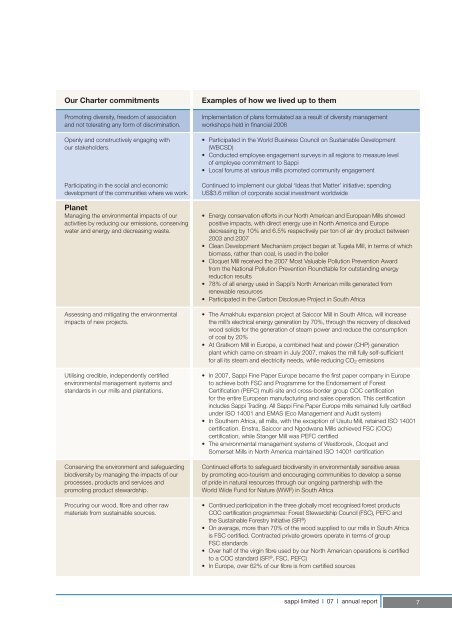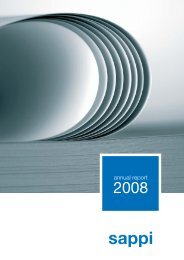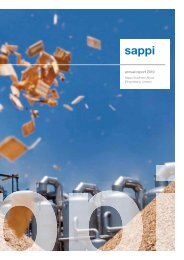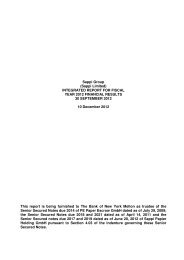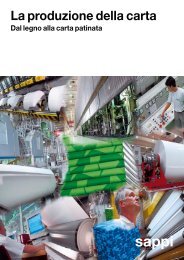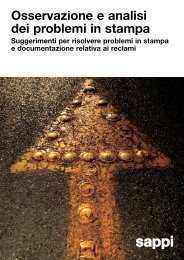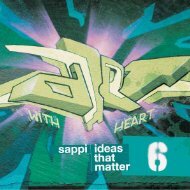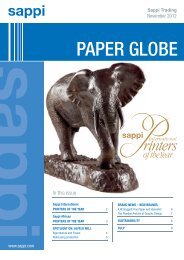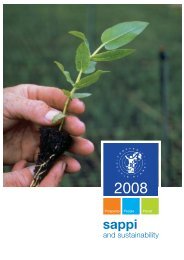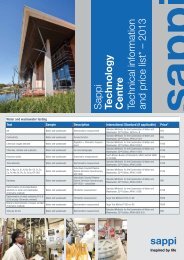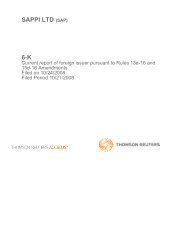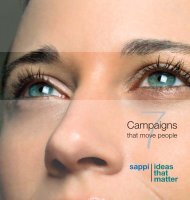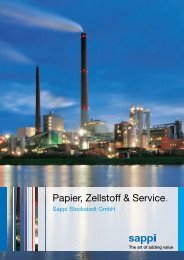2007 Annual Report - Sappi
2007 Annual Report - Sappi
2007 Annual Report - Sappi
Create successful ePaper yourself
Turn your PDF publications into a flip-book with our unique Google optimized e-Paper software.
Our Charter commitments<br />
Examples of how we lived up to them<br />
Promoting diversity, freedom of association Implementation of plans formulated as a result of diversity management<br />
and not tolerating any form of discrimination. workshops held in financial 2006<br />
Openly and constructively engaging with<br />
our stakeholders.<br />
Participating in the social and economic<br />
development of the communities where we work.<br />
Planet<br />
Managing the environmental impacts of our<br />
activities by reducing our emissions, conserving<br />
water and energy and decreasing waste.<br />
Assessing and mitigating the environmental<br />
impacts of new projects.<br />
Utilising credible, independently certified<br />
environmental management systems and<br />
standards in our mills and plantations.<br />
Conserving the environment and safeguarding<br />
biodiversity by managing the impacts of our<br />
processes, products and services and<br />
promoting product stewardship.<br />
Procuring our wood, fibre and other raw<br />
materials from sustainable sources.<br />
• Participated in the World Business Council on Sustainable Development<br />
(WBCSD)<br />
• Conducted employee engagement surveys in all regions to measure level<br />
of employee commitment to <strong>Sappi</strong><br />
• Local forums at various mills promoted community engagement<br />
Continued to implement our global ‘Ideas that Matter’ initiative; spending<br />
US$3.6 million of corporate social investment worldwide<br />
• Energy conservation efforts in our North American and European Mills showed<br />
positive impacts, with direct energy use in North America and Europe<br />
decreasing by 10% and 6.5% respectively per ton of air dry product between<br />
2003 and <strong>2007</strong><br />
• Clean Development Mechanism project began at Tugela Mill, in terms of which<br />
biomass, rather than coal, is used in the boiler<br />
• Cloquet Mill received the <strong>2007</strong> Most Valuable Pollution Prevention Award<br />
from the National Pollution Prevention Roundtable for outstanding energy<br />
reduction results<br />
• 78% of all energy used in <strong>Sappi</strong>’s North American mills generated from<br />
renewable resources<br />
• Participated in the Carbon Disclosure Project in South Africa<br />
• The Amakhulu expansion project at Saiccor Mill in South Africa, will increase<br />
the mill’s electrical energy generation by 70%, through the recovery of dissolved<br />
wood solids for the generation of steam power and reduce the consumption<br />
of coal by 20%<br />
• At Gratkorn Mill in Europe, a combined heat and power (CHP) generation<br />
plant which came on stream in July <strong>2007</strong>, makes the mill fully self-sufficient<br />
for all its steam and electricity needs, while reducing CO 2 emissions<br />
• In <strong>2007</strong>, <strong>Sappi</strong> Fine Paper Europe became the first paper company in Europe<br />
to achieve both FSC and Programme for the Endorsement of Forest<br />
Certification (PEFC) multi-site and cross-border group COC certification<br />
for the entire European manufacturing and sales operation. This certification<br />
includes <strong>Sappi</strong> Trading. All <strong>Sappi</strong> Fine Paper Europe mills remained fully certified<br />
under ISO 14001 and EMAS (Eco Management and Audit system)<br />
• In Southern Africa, all mills, with the exception of Usutu Mill, retained ISO 14001<br />
certification. Enstra, Saiccor and Ngodwana Mills achieved FSC (COC)<br />
certification, while Stanger Mill was PEFC certified<br />
• The environmental management systems of Westbrook, Cloquet and<br />
Somerset Mills in North America maintained ISO 14001 certification<br />
Continued efforts to safeguard biodiversity in environmentally sensitive areas<br />
by promoting eco-tourism and encouraging communities to develop a sense<br />
of pride in natural resources through our ongoing partnership with the<br />
World Wide Fund for Nature (WWF) in South Africa<br />
• Continued participation in the three globally most recognised forest products<br />
COC certification programmes: Forest Stewardship Council (FSC), PEFC and<br />
the Sustainable Forestry Initiative (SFI ® )<br />
• On average, more than 70% of the wood supplied to our mills in South Africa<br />
is FSC certified. Contracted private growers operate in terms of group<br />
FSC standards<br />
• Over half of the virgin fibre used by our North American operations is certified<br />
to a COC standard (SFI ® , FSC, PEFC)<br />
• In Europe, over 62% of our fibre is from certified sources<br />
sappi limited | 07 | annual report 7


